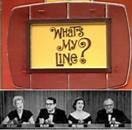1 Corinthians 12:19-21 (NIV)
If they were all one part, where would the body be? As it is, there are many parts, but one body. The eye cannot say to the hand, “I don’t need you!” And the head cannot say to the feet, “I don’t need you!”
Many years ago, there was a TV program called What’s My Line? The panel had to guess the visitor’s job.
In any group, people have distinct roles. Sometimes we have tasks we would rather avoid. Parents would prefer to be “buddies” with their children when discipline is needed. There are many other cases where we would rather take the popular route rather than the firm route. But somebody must do the lifting, or the object isn’t moved.
Sadly, even though many people know that what was done was necessary, the person who did it is seen as mean. In politics, an opponent will use that against them. This is the case for government officials who enforce the law.
In a family, parents who never say “No” may be popular with young children, but the results are often disastrous. Parents set boundaries that grow wider as the child matures. Eventually, the child has internalized the discipline and habits of a mature adult who contributes to society.
Children are taught to be careful around strangers. Parents lock the doors to protect the child. For the family’s safety, a parent decides whether a given person may enter the house. They manage household income to ensure the family’s needs are met. They contribute money, time, and effort to help other people and train their children to do likewise.
In Matthew 22, Jesus was talking about taxes when he said, “Therefore render to Caesar the things that are Caesar’s, and to God the things that are God’s.” But the authorities have the power and the obligation to act in ways that citizens and church officials cannot.
In one sense, governments are like parents. But there is a significant difference. As described in the preamble to the U. S. Constitution, governments exist to” insure domestic Tranquility, provide for the common defence, and promote the general Welfare.” To do this, they can restrain, fine, imprison, or deport people who, through their actions, have shown they pose a threat to society.
Pope Leo XIV recently released an Apostolic Exhortation entitled Dilexi Te. He argues the church has always had a concern for the poor. That is appropriate. Its focus is “the things that are God’s.” Rulers have the duty to provide an environment where the public can safely work, raise a family, worship freely, and help the poor as their gifts allow.
This means the leaders also have the task of “locking the door” by controlling the borders. They must make rules about who can enter and stay. The government also sets limits and procedures. It has an obligation to ensure regulations are sufficiently stringent to prevent harm to its citizens.
Parents are not expected to randomly receive many children to raise and care for in addition to their own. A country has no moral obligation to do the same kind of thing. In both cases, the starting children or citizens feel cheated. It is even worse when the newcomers include violent criminals, and nobody stops them. The public is more outraged when they are expected to tolerate behavior from the newcomers that they would never accept from locals.
Even if every newcomer were a saint, the numbers would still be overwhelming. The initial infrastructure was not ready for the new population. Housing, schools, and hospitals were overloaded. Young people are frustrated when they see their prospects for buying a home disappear. Schools are overcrowded and filled with children who are just starting to learn English. Emergency rooms are overwhelmed. The main ER I would like to use is unavailable. I waited seven hours the last time I went there. Many of the immigrants had criminal records before they came here. Any attempt at screening would have blocked them.
Some people benefit from having these people here, regardless of the harm others suffer. Both political parties have members who want it to stay this way. The Democrats use the numbers to get seats in the Census and “voters.” These people can be used for cheaper labor.
The Catholic bishops are opposed to the effort to send back the people who shouldn’t be here. They have Leo’s DiLexi Te as support. But that is misleading. That writing is fine as a church document, but it doesn’t overrule appropriate government behavior. When a ruling official is deporting people who entered illegally and, in many cases, committed crimes here, there is no moral reason to oppose that action. There is, however, a financial reason. Catholic Charities receives substantial funding for services to immigrants. That would end if there were none.
Leaders in both North America and Western Europe have failed their citizens for too long. The “far right” parties in Europe are not nationalist in the sense of being genocidal. They expect, or instead demand, that their governments start providing police protection for their own citizens when the newcomers are the perpetrators. They can’t see why the government is putting immigrants in 4 and 5‑star hotels when their own citizens can’t afford housing, heat, or medicine.
In the United States, the issues are similar but even stranger. The public voted for change. They want criminal immigrants to be deported, but local mayors are telling their police departments to resist federal law enforcement. Are these people politically deaf? Don’t they understand their job?
It’s time to take these people back to basics so they can figure out what they’re supposed to be doing, or ”What’s My Line?”

